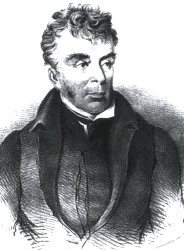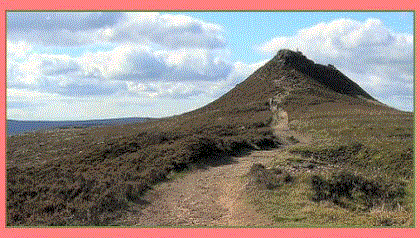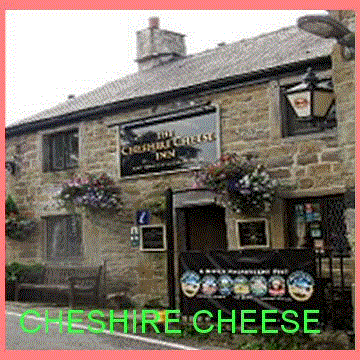

“Win-Hill”
A Study Of The Poem By Ebenezer Elliott
This
paper looks at several interesting features of the poem which has
received
little attention since it was written nearly two hundred years ago.
Those
of us who have hiked in Derbyshire’s Peak District know that Win Hill
is in the
Hope Valley near the village of Hope. Lose Hill lies opposite Win Hill,
and
legend conjures a Dark Ages battle taking place here. In a footnote to
his
poem, Elliott described Win Hill as “the central mountain – not the
highest –
of the Peak of Derbyshire.” A stroll from Win Hill is the 16th
century public house called the Cheshire Cheese which is the inn
mentioned in
the poem.
Elliott
referred to his poem in two letters written in 1833. In one he boasted
that his
children admired the poem; in the other letter, he judged the poem one
of his
best. The letters therefore reveal that “Win-Hill” was composed in 1833.
1833
was an interesting time for the Bard of the Beggars as Elliott once
called
himself. His “Corn Law Rhymes” had just received great acclaim from the
critics;
his iron & steel business in Sheffield was picking up; he was an
influential figure in local politics, and the Reform Bill had just been
passed
– much to Elliott’s delight as a strident activist for reform.
By
1833 the Corn Law Rhymer had moved on from his early days in Rotherham,
where
he went bankrupt, to a life in Sheffield where he had become a national
celebrity for his political verse. Indeed, he was even known abroad.
His fame
spurred him to churn out poem after poem – at least 17 were written in
1833
when he produced “Win-Hill.” Compare that with 1830 when only 3 poems
appeared.
(For a detailed look at Elliott and his output, please visit www.judandk.force9.co.uk/elly.htm).
“Win-Hill” was dedicated to Francis Place, the London radical who helped draft the People’s Charter. Out of courtesy, Elliott would have contacted Place for permission to use the dedication. Their politics were similar & they would have been in constant contact. (Some letters between them from 1834 have survived. And in 1836 they were both committee members of the London Corn Law Association which Place helped to found)
Elliott entitled his poem “Win-Hill – The Curse of God.” In his 1833 letters, he referred to the subtitle both as “The Curse of God” and “The Curse.” The latter may be just shorthand. The subtitle has some significance at the end of the poem.

Win
Hill in the HopeValley
The
Corn Law Rhymer liked to write long poem: for instance, his 1829 poem
“The
Village Patriarch” is about 100 pages long. “Win-Hill” is a lengthy
poem for
the modern reader but with Elliott’s free flowing output it could
probably be
couched as of moderate length. The work uses Spenserian stanzas and
there are
32 of them. Each stanza is required to be of nine lines, giving a total
of 288
lines of poetry. The last line of each stanza is the longer iambic
hexameter while
the rest are iambic pentameters. The rhyme arrangement is A B A B B C B
C C.
Spenserian stanzas are difficult to write, and Elliott is to be
applauded for
using this tricky format for 32 stanzas. (The bard used this verse form
in 9
other poems entitled “Spenserian”, but fortunately he restrained
himself to
just one stanza!).
In
Elliott’s preface to “Rhymed Rambles” – an assembly of 36 sonnets – the
poet
gave his opinion on the merits of stanzas & sonnets: “The
Spenserian
stanza, requiring four rhymes, is quite as difficult as the Petrarchan
sonnet,
the latter being little more than a series of couplets and triplets;
and I
venture to suggest that – preceded by five lines, linked to it in
melody, and
concluding occasionally with an Alexandrine – or preceded by four lines
only,
if considered with a triplet – the far famed measure of Spenser is the
best
which the English sonneteer can employ.” Clearly the poet was well
versed in
the technical side of poetry as well as being a skilful exponent of the
art.
To walk
from Elliott’s Upperthorpe home in Sheffield to the village of Hope is
a goodly
journey, being about 13 miles as the crow flies. Elliott would have set
off
walking soon after dawn; he was well used to long tramps – Sheffield
folk liked
to escape Sheffield’s soot and to renew themselves in the beauty of the
Derbyshire
countryside.
After
the long trek (and faced with a long march back home), the Bard of
Poverty was
ready for refreshment. When he spotted the Cheshire Cheese public
house, he
declared “But, lo, the Inn! The mountain girded Inn!” and added “To
pass it
fasting were a shame and sin.” So he lingered there and somewhat
reluctantly wrote:-
“Refresh,
and pay, then stoutly travel on!
Ay,
thou
hast need to pree* the barley-wine;
Steep
is th’assent,
O bard! thou look’st upon;
To
reach
that cloud-capt seat, and throne divine,
Might
try a
stronger frame and younger limbs than thine.”
(
*
to pree is to trial)
Note
here that Elliott used the phrase the “throne divine”
to describe Win Hill. He felt the mountain was majestic and stated this
several
times in the poem. He even designated Win Hill “The King of the Peak”
and
proudly referred to it as “Yon monarch of our Alps!”
Sustained
by food and drink at the Cheshire Cheese, Elliott felt better prepared
for his climb:-
“Now
having
drunk of jolly ale enough,
To
climb
Win-Hill is worth ambition – yea!”
And
a few lines later the refreshed bard proclaimed:-
“If thou would’st climb Win-Hill, drink old and jolly ale.”

Public House
Visited by Ebenezer Elliott
Elliott
was always entranced by his natural surroundings and viewed the
landscape with
an artist’s eye. In “Win-Hill” for instance we read of the “bluebell
haunted
shade” and on reaching the summit, the poet wrote:-
“I
sit bareheaded,
ankle deep
In
tufts of
rose-cupp’d bilberries.”
Yet
his poetry increasingly turned away from nature’s
beauty to the political issues of the time. Something which made him
unusual. Most
critics of his day viewed this stance as distasteful.
Impressed
by the timelessness of the mountain and its grandeur, Elliott went on
to ponder
the role of the Almighty in his surroundings. This consideration became
the
main theme of the poem; remember, here, that the subtitle of the poem
is “The
Curse of God.”
The
mood of the poem then changed when Elliott recalled that a stranger had
died on
the mountain in the snow. “This spot is
hallow’d … to death and sorrow,” the poet decided. His mind dwelt on
the
stranger’s lonely death on the cruel, bleak summit. In a footnote to
the poem,
the poet recounted that the stranger’s skeleton had been found some
time ago
and removed to Hope churchyard “where it remains, uncoffined and
uninterred.”
Elliott was always fascinated by the macabre and after this lurid tale,
his
attention turned to an approaching storm seeing it as a reflection of
God’s anger
with a world where the powerful ignore the plight of the poor who
perish lonely
and afraid as did the stranger on the summit of Win Hill.
In
a letter to the New Monthly Magazine, the Corn Law Rhymer commented on
his “Win-Hill”
poem: “I wish I could have kept the politics out, but they would be
in.” The
poet’s new-found fame stemmed from his frenzied verse about the Bread
Tax which
was his name for the Corn Laws. In “Win-Hill” he threatened “ye
gore-gorged
foes of want and toil, beware!” He urged “thou bread tax’d Artisan” to
visit
Win Hill but warned that “The bread tax exile” could perish in this
“land of
age-long woes!” Change was overdue, he declared:-
"When
will
the night of our despair be past?
And
bread-tax’d slaves become Men, godlike Men, at last!”
Even
the Almighty was challenged:-
“When
wilt
Thou hear their mute and long despair?
Lord,
help
the poor!”
He
continued with the question when will “The famine-smitten
millions cease to groan?” and he wailed about “the torturers of each
troubled
land.” More politics appeared in stanza 26 where Elliott alluded to the
political
situation in Poland – the bard had a surprising knowledge of European
affairs. (Another
poem written in the same year as “Win-Hill” was entitled “The Polish
Fugitives”).
Towards the
end of “Win-Hill,” it is difficult to follow
Elliott’s slant. We have already seen him imploring the Almighty to
take action
to help the poor. He subsequently has a vision of God astride the Hope
Valley
taking action by showering curses on the lords and squires who ruled
the land
and oppressed the rest of the population. In stanza 30, the puzzling
line “And
cursed for evermore the Legion-Fiend of Land” would support this view.
The last
few stanzas of “Win-Hill” repeat the phrase “He is accursèd,”
emphasising “The
Curse of God” (the poem’s subtitle) falling on the wicked landowner. A
similar
notion appeared in Elliott’s poem “Air, Light, Food, Life” where
squires and
lords even dare tax air, light and food … and they “curse the blessed
sod” – a
phrase which occurs in the last line of “Win-Hill.”
“Win-Hill”
has many topographical references which are interesting to local
people: the
shivering mountain of Mam Tor, the wonderful Winnats Pass above
Castleton, the
Kinder Scout plateau above Edale and the formidable Bleaklow moorland
aptly
described as “Black Blakelow.”In fact Elliott makes so many references to Peak District features that he could qualify as the Poet of The Peak.
(For instance we have these poems: *** We Are Not Lonely Kinderscout
*** Cloudless Stanage *** Noon On Great Kinder *** Tree of Rivelin
*** Farewell To Rivelin *** Ribbledin).
The
complicated Spenserian verse form is well handled by the Rhymer, and
this will
be much appreciated by versification geeks. As to the quality of the
poetry, it
is significant that most authorities have not drawn attention to the
work. It
is far from being among the best efforts of the Poet of the Poor, and
as
Elliott once remarked: “The mere heaviness of my poetry will sink me.”
“Win-Hill” is perplexing for the modern reader, but I for one have quite enjoyed examining this poem by the Corn Law Rhymer.
Win Hill also gets a mention in "The Year Of Seeds," - namely in Sonnet no. 8 which begins:-
"All hail, Westknab! Great Kinder! Blakelowscar!
Stanedge!
Winhill! Storm's Blackstone!"
